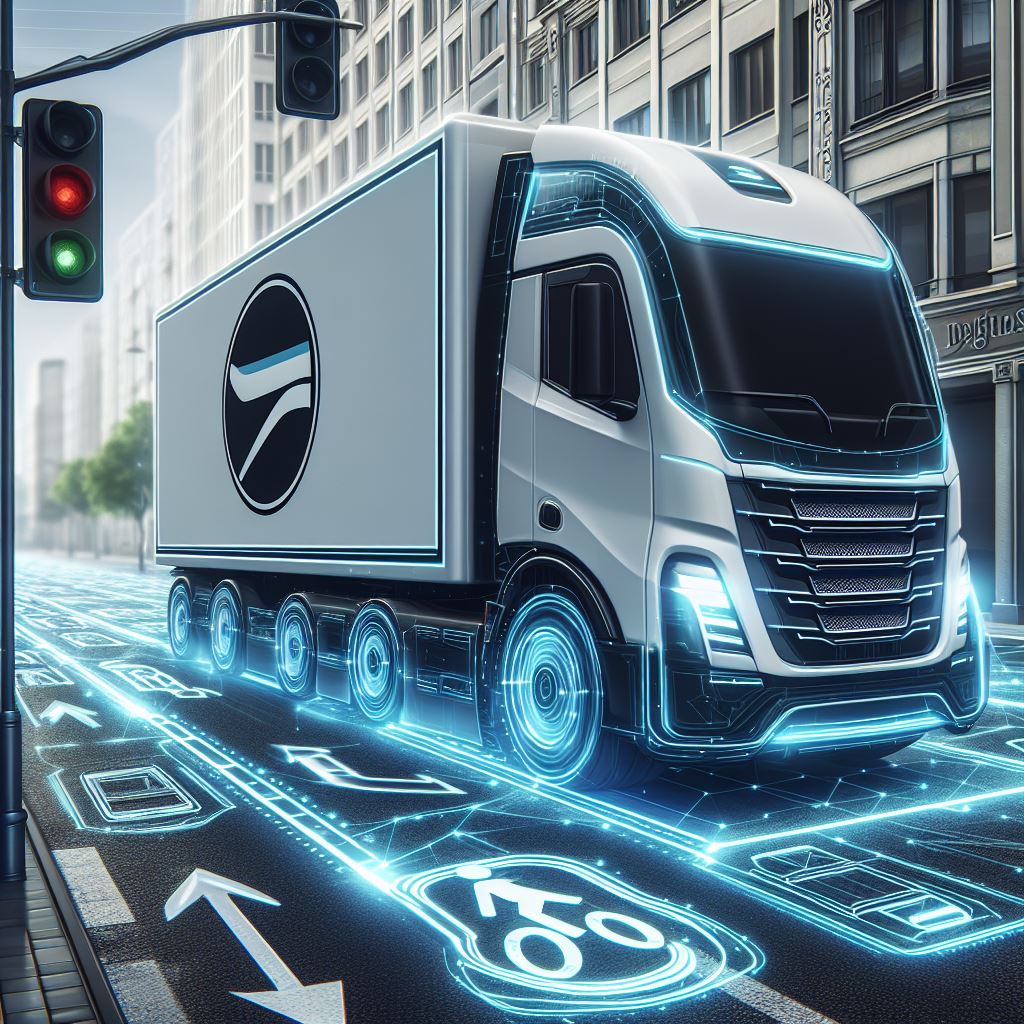AI Case Studies: How Logistics Companies Are Using AI to Improve Their Operations
Companies are always looking for new ways to improve their processes and stay ahead of the competition in logistics and shipping. Artificial intelligence (AI) is one of the most important technological advances that is causing this change. With the help of case studies, this article looks at how different shipping companies are using AI to change their processes, from predictive analytics to self-driving trucks.
The Benefits of AI in Logistics
The integration of Artificial Intelligence (AI) into logistics operations opens up a realm of possibilities, altering how companies approach the movement of goods from origin to destination. The benefits of AI in logistics are vast and varied, touching on every aspect of the supply chain.
Increased Operational Efficiency
One of the most immediate benefits of AI is the significant boost in operational efficiency. AI algorithms optimize routing and load planning, reducing fuel consumption and improving delivery times. For instance, machine learning models can predict the most efficient routes in real-time, considering factors such as traffic conditions, weather, and vehicle capacity. This optimization leads to faster delivery times and lower operational costs, directly impacting the bottom line.
Enhanced Inventory Management
AI-driven systems offer unparalleled precision in inventory management, predicting demand patterns, and automating restocking processes. By analyzing sales data, AI can forecast future demand with high accuracy, ensuring that inventory levels are optimized to meet consumer demand without overstocking. This predictive capability reduces waste, saves storage costs, and minimizes the risk of stockouts, ensuring that products are available when and where they are needed.
Improved Customer Satisfaction
AI technologies play a crucial role in improving customer satisfaction by offering personalized experiences and real-time tracking. AI-powered chatbots provide instant customer support, answering queries, and solving problems around the clock. Furthermore, AI systems enhance the tracking of shipments, giving customers up-to-date information about their orders’ status. This transparency and efficiency lead to a more trustworthy and satisfactory customer experience.
Risk Management and Mitigation
AI aids in identifying potential risks and vulnerabilities within the supply chain, from supplier issues to potential delays. By analyzing vast amounts of data, AI can highlight areas of concern before they become critical problems, allowing companies to mitigate risks proactively. This foresight helps in maintaining smooth operations and safeguarding against unforeseen disruptions.
Automation of Repetitive Tasks
AI excels in automating repetitive and time-consuming tasks, such as data entry, invoice processing, and order updates. This automation frees up human employees to focus on more strategic and creative tasks, increasing productivity and innovation within the logistics sector. By reducing the reliance on manual processes, companies can minimize errors and increase the speed of operations.
Sustainable Operations
AI contributes to more sustainable logistics operations by optimizing routes and reducing waste, leading to lower carbon emissions. Intelligent algorithms can calculate the most fuel-efficient routes, and AI-powered analytics can improve packaging efficiency, reducing material waste. These environmentally friendly practices are not only good for the planet but also resonate with increasingly eco-conscious consumers.
How To Implement AI in Logistics
Implementing AI in logistics involves deploying artificial intelligence technologies across various facets of the supply chain to optimize operations, enhance decision-making, and improve service delivery. Here’s an overview of how AI is being implemented in logistics:
Predictive Analytics for Demand Forecasting and Route Optimization
AI algorithms analyze historical data and predict future trends in demand, helping companies plan their inventory and workforce needs more accurately. Predictive analytics can also forecast optimal routes and delivery schedules by considering factors like traffic patterns, weather conditions, and delivery windows. This ensures that goods are delivered efficiently, reducing fuel consumption and improving delivery times.
Autonomous Vehicles and Drones for Delivery
Companies are experimenting with autonomous vehicles and drones for last-mile deliveries and warehouse operations. These vehicles can navigate routes independently, reducing the need for human drivers and potentially lowering delivery costs. Drones, for instance, are being tested for delivering packages in urban and remote areas, offering a speedy and cost-effective solution for small deliveries.
Warehouse Automation with Robots and AI Systems
Robotic systems in warehouses can pick, pack, and sort goods with high efficiency and accuracy. These robots are often guided by AI algorithms that optimize their paths within the warehouse to minimize travel time and improve the handling process. Automation reduces the chances of human error, speeds up the processing of orders, and can operate around the clock, increasing productivity.
Advanced Data Analytics for Supply Chain Visibility
AI-powered analytics platforms provide end-to-end visibility of the supply chain, allowing companies to monitor the flow of goods in real-time. These systems can identify inefficiencies, predict potential disruptions, and suggest corrective actions. Enhanced visibility helps logistics companies to be more proactive in managing their supply chains, ensuring that they can respond quickly to any issues that arise.
AI-Driven Customer Service Solutions
|AI technologies are being used to improve customer service in logistics. Chatbots and virtual assistants, powered by natural language processing (NLP), can handle customer inquiries, provide shipment tracking updates, and resolve issues without human intervention. This ensures customers have access to support 24/7, improving satisfaction and engagement.
Smart Logistics and IoT Integration
Integrating AI with the Internet of Things (IoT) enables smart logistics solutions, where sensors and connected devices throughout the supply chain provide real-time data on the condition and location of goods. AI algorithms analyze this data to optimize routes, manage inventory, and predict maintenance for vehicles and equipment, reducing downtime and extending their operational life.
Security and Compliance Monitoring
AI can enhance security within the logistics chain by monitoring for fraudulent activities and ensuring compliance with regulations. Machine learning models can detect unusual patterns that may indicate theft or fraud, while AI systems ensure that shipments comply with international laws and regulations, reducing the risk of penalties and delays.
AI’s implementation in logistics is multifaceted, focusing on automating operations, enhancing decision-making, and improving customer service. As these technologies continue to evolve, their role in logistics is expected to become even more integral, driving efficiencies and innovation in the sector.
AI Case Studies: How Logistics Companies Are Using AI to Improve Their Operations
With the rise of AI, the logistics industry is seeing monumental change. Artificial intelligence (AI) plays an essential part in a society where speed, precision, and efficiency are of the utmost importance by providing solutions that were previously thought to exist only in science fiction. To illustrate how logistics organizations throughout the globe are transforming their operations, improving service delivery, and gaining a competitive advantage through the use of AI, this section explores real case studies.
From deploying predictive analytics that forecast demand and optimize routes, to integrating autonomous vehicles that promise safer and more reliable transport, AI is at the forefront of innovation in logistics. These real-world applications not only demonstrate the potential of AI to streamline supply chain processes but also highlight the strategic insights companies gain, enabling them to predict trends, personalize customer experiences, and manage resources more effectively.
Enhancing Efficiency with Predictive Analytics
One of the key areas where AI is making a mark in logistics is through predictive analytics. Companies like UPS have implemented advanced AI algorithms to analyze historical data and predict future package volumes, routes, and delivery times. This predictive capability allows them to optimize their delivery routes, reduce fuel consumption, and improve on-time delivery rates. By anticipating demand spikes and potential bottlenecks, logistics companies can allocate resources more effectively, ensuring seamless operations even during peak periods.
Automated Warehouses: A Leap into the Future
Amazon has significantly invested in robotics and AI to improve efficiency and safety in its fulfillment centers. As of recent reports, Amazon has deployed over 750,000 robots across its operations. These robots include advanced systems like Sequoia and Digit, which are designed to assist employees and expedite order fulfillment processes. Sequoia, for instance, has been implemented to speed up the storage and management of inventory, enabling Amazon to increase the accuracy of delivery estimates and improve workplace safety. This integration of robots into their operations not only enhances productivity but also plays a crucial role in ensuring that repetitive tasks are handled efficiently, allowing human employees to focus on more complex tasks.
The Advent of Autonomous Vehicles
Autonomous vehicles, specifically self-driving trucks, are set to transform the logistics industry, with companies like Waymo and its partnership with Daimler leading the charge. Waymo has announced an increase in its fleet of self-driving trucks to 60 units, focusing on operations in Texas and Arizona, marking significant progress toward Level 4 autonomy where vehicles operate independently in certain conditions. This expansion underscores the potential for these technologies to enhance operational efficiencies and safety in goods transportation.
Deloitte Insights highlights the economic and operational benefits anticipated from autonomous technology in logistics, including a projected 30% reduction in per-mile costs compared to current models, driven by decreased labor costs, enhanced driving times, improved fuel efficiency, and better safety performance. Furthermore, autonomous trucks could double their daily range from 600 to 1,200 miles, significantly increasing delivery capacity without expanding fleet sizes, which is critical for meeting the increasing demand for faster and more predictable shipping.
AI in Customer Service: Enhancing Interaction and Satisfaction
Integrating AI chatbots into logistics customer service significantly enhances operational efficiency and customer satisfaction. Powered by advanced technologies like Natural Language Processing (NLP) and Machine Learning (ML), chatbots can handle up to 79% of basic inquiries, leading to a potential 30% reduction in customer support costs. These AI-driven assistants offer 24/7 support, managing tasks ranging from real-time delivery tracking to fleet management with remarkable efficiency.
The widespread adoption of chatbots is reflected in consumer preferences, with a significant percentage of customers indicating companies need to transform their engagement approaches. Interestingly, only a few consumers express a desire to interact with human agents, underscoring the growing acceptance and expectation for chatbot interactions in the logistics sector.
Challenges and Considerations
The integration of Artificial Intelligence (AI) into logistics operations offers transformative potential, streamlining processes and enhancing efficiency across the supply chain. However, this technological advancement comes with its own set of challenges and considerations, which businesses must navigate carefully to leverage AI’s benefits fully.
High Initial Investment
The implementation of AI in logistics requires a significant upfront investment. AI systems, being highly customized and complex, involve costs associated with purchasing hardware and software and integrating these technologies into existing systems. The hardware, often cloud-based to handle the extensive data processing AI requires, and the scalability factor, where some AI systems need a substantial initial user base to be effective, contribute to the financial burden.
Additionally, the cost of training personnel to use these new systems can be considerable, affecting short-term business efficiency.
Operational Costs and Maintenance
AI-operated machinery and systems have high operational costs. These include the expense of replacing parts made from rare materials, the need for constant software updates, and the high energy consumption required for AI machines to function optimally. These factors can lead to increased utility bills and maintenance costs, impacting the overall operational budget
Workforce Implications
The automation brought about by AI can lead to a reduction in human jobs, posing ethical and social challenges for logistics companies. The displacement of workers due to AI integration requires careful consideration of the human impact, including the need for retraining and redeployment of affected employees
Data Security and Privacy
With AI systems relying heavily on data, data security and privacy concerns emerge as significant challenges. Protecting sensitive information from breaches and unauthorized access is paramount, necessitating investments in secure data storage and adherence to stringent data protection regulations
Ethical Considerations and Human Oversight
Maintaining a balance between automated efficiency and human insight is crucial. Despite AI’s capability to process and analyze vast amounts of data, the need for human oversight remains, to ensure ethical decision-making and contextual understanding that AI alone may not provide. Ensuring AI models adhere to ethical principles and incorporate transparency and fairness is essential for gaining public trust and acceptance
Final thoughts
The use of AI in logistics marks a significant departure towards operations that are more responsive, efficient, and focused on the client. Logistics firms who want to be at the forefront of innovation and leadership should form partnerships with tech companies like RTS Labs. This will help them use AI to its full potential, increase efficiency, and redefine the boundaries of what is possible in supply chain management and logistics.
For additional information and professional help, visit RTS Labs‘ website. They can change your logistics operations with AI and data-driven solutions.






